Table of Contents
- 1 Maximizing Your EV Performance and Longevity
- 2 What Does Regular Maintenance for an EV Look Like?
- 3 Explaining Specific EV Maintenance Procedures
- 4 Avoiding Regular EV Maintenance Problems
- 5 DIY or Call a Professional: Making the Right Decision
- 6
- 7 Securing a Greener Tomorrow: The Importance of EV Maintenance
- 8 Common Questions: How to Easily Maintain Your Electric Vehicle
- 9 Author
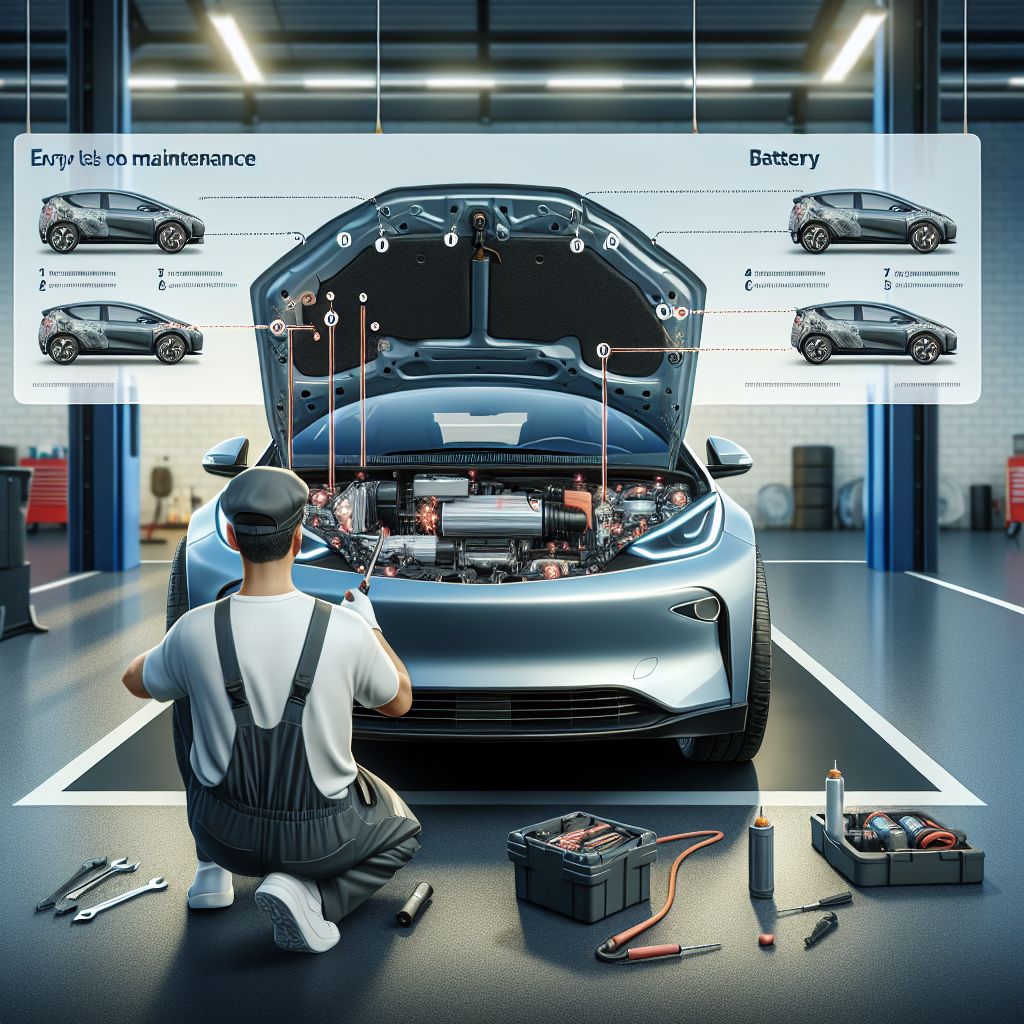
Key Takeaways: Quick Tips for EV Maintenance
-
Battery care is crucial for EV longevity – regular checks and proper charging habits are key.
-
Keep tires properly inflated and rotate them regularly to maintain safety and efficiency.
-
Brake systems on EVs may have less wear, but they still require routine inspections.
-
Fluids may be fewer in EVs, but checking them is a fundamental part of maintenance.
-
Stay on top of software updates and diagnostics to ensure optimal EV performance.
Maximizing Your EV Performance and Longevity
When you switch to an electric vehicle (EV), you’re not just adopting a new way to drive; you’re embracing a whole new approach to car maintenance. Because EVs have fewer moving parts than traditional vehicles, they require different upkeep. But don’t worry, I’m here to walk you through the essentials of maintaining your EV, ensuring it stays road-ready for years to come.
Caring for Your Battery: How to Get the Most Out of It
Consider your EV’s battery its lifeblood. Like your own heart, you want to keep it in the best shape possible. This involves:
-
Make sure to frequently check the battery’s charge and overall health.
-
Stay away from extreme temperatures as they can put a lot of stress on the battery.
-
Adhere to a charging schedule that prevents overcharging or deep discharging.
But above all, it’s essential to know the specific battery care advice for your EV, which you can usually find in the owner’s manual.
Checking Tire Condition: A Key to Safety and Energy Efficiency
Did you realize that keeping your tires properly inflated can extend the range of your EV? It’s a fact. If your tires are under-inflated, they create more rolling resistance, meaning your EV has to work harder to get you to your destination. So, be sure to check your tire pressure on a regular basis. In addition, rotating your tires can prevent uneven wear, which not only extends the life of your tires but also helps your EV run smoothly and efficiently.
Brake System: Less Wear but Still Requires Attention
Electric vehicles, thanks to regenerative braking, usually have less brake wear than traditional vehicles. But this doesn’t mean you can forget about the brakes. Listen for any strange sounds and watch the thickness of the brake pad. If something seems off, it’s best to have it inspected as soon as possible.
Fluid Checks: Less Frequent, But Still Essential
Electric vehicles may not need oil changes, but they do have other fluids that need to be monitored, such as brake fluid and coolant. Ensure these are checked and refilled as necessary to keep your vehicle in top shape.
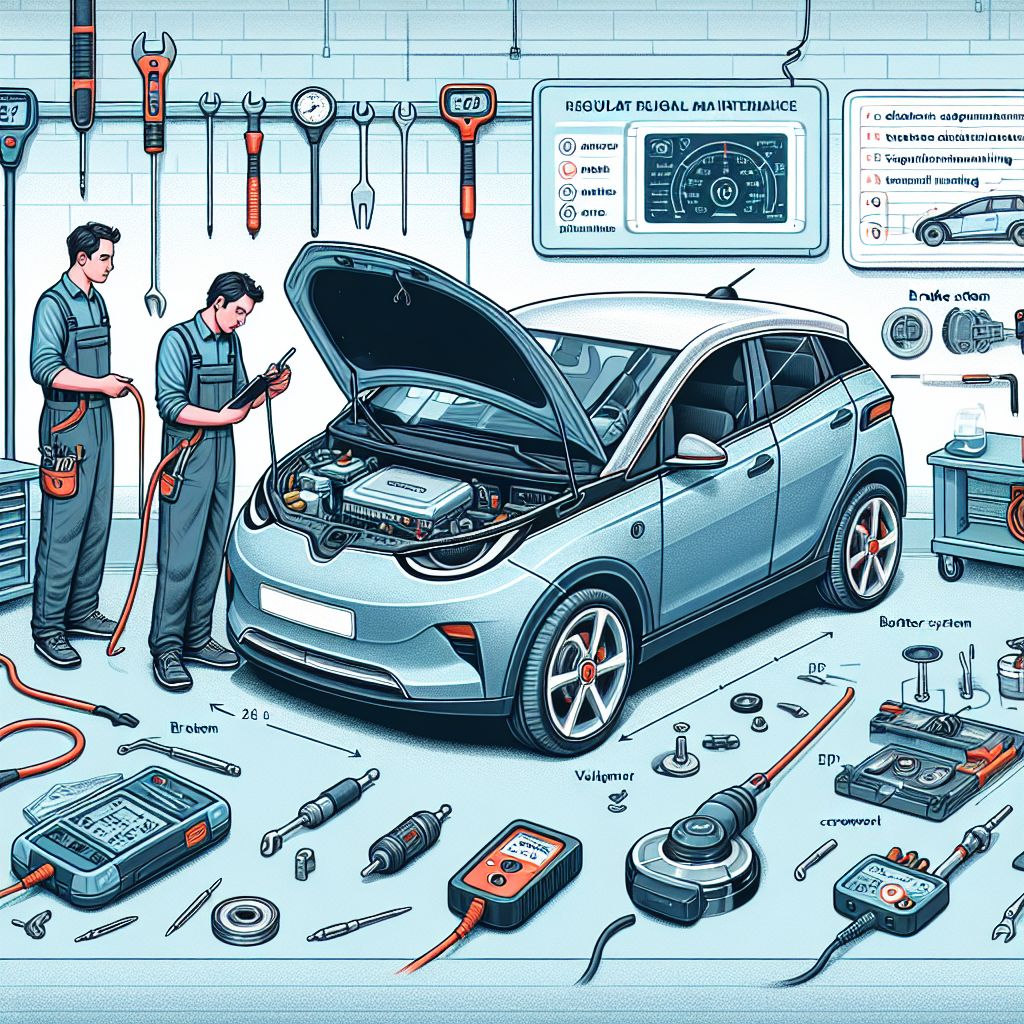
What Does Regular Maintenance for an EV Look Like?
Regular maintenance for an EV is quite simple. It’s about taking care of the basics to make sure your vehicle is running smoothly. The best part is that you’ll probably spend less time and money on maintenance than you would with a gas-powered car. However, it’s important to remember that failing to do these simple tasks can cause bigger problems in the future, so it’s better to stay on top of them.
Day-to-Day and Monthly Battery Upkeep
Day-to-day maintenance is as easy as keeping an eye on your charge level and avoiding regularly charging your battery to 100% – try to keep it between 80-90% to prolong its lifespan. Every month, examine the battery’s performance indicators available on your EV’s built-in computer or a specific app. For more detailed information, check out this guide on how to maintain an electric car.
Bi-Annual Check Ups: Staying Ahead of Wear and Tear
Just like a human body, your EV needs a regular check-up to catch any potential issues early. Every six months, or as recommended by your manufacturer, schedule a professional inspection. They’ll look at the high-voltage battery’s connections and health, check the electric motor(s), and ensure the cooling system is functioning properly. These check-ups are vital to prevent unexpected repairs and maintain your EV’s warranty.
Comparison of Electric Car Maintenance vs Gasoline Car Maintenance
|
Aspects |
Gasoline Cars |
|
|---|---|---|
|
Moving Parts |
One moving part (the motor) |
Hundreds of moving parts |
|
Maintenance Requirements |
Less frequent and lower costs |
More frequent and higher costs |
|
Maintenance Costs |
Lower maintenance costs due to fewer moving parts and regenerative braking |
Higher maintenance costs due to more moving parts and frequent oil changes, filter replacements, and exhaust system repairs |
|
Battery Life |
Typically, batteries last 8-10 years with proper maintenance |
Not applicable |
|
Battery Maintenance |
Regularly checking battery health, especially in hotter climates |
Not applicable |
|
Service Intervals |
Once a year or every 10,000-20,000 miles |
More frequent service checks |
|
Lifespan |
Can last for more than 15 years with proper maintenance |
Typically, last for 8-10 years |
|
Regenerative Braking |
Energy is recovered and put back into the car’s battery, extending the overall range |
Not applicable |
|
Fuel Efficiency |
More energy-efficient, can travel about 43 miles for $1.00 |
Less energy-efficient, can travel about 18 miles for $1.00 |
|
Challenges |
Limited range, availability of skilled service technicians, and infrastructure to recharge the batteries |
Limited range, availability of charging stations, and infrastructure to recharge the batteries |
|
Maintenance Costs Over Lifetime |
$4,600 on average |
$9,200 on average |
Explaining Specific EV Maintenance Procedures
Rotating and Balancing EV Tires: How to Do It
Rotating your tires is a straightforward but crucial task that can help lengthen their lifespan and maintain your EV’s efficiency. Here are the steps to do it:
-
Use the correct jacking points to raise your EV.
-
Remove the wheels by unscrewing the lug nuts.
-
Switch the front wheels to the back, and vice versa; some manufacturers also suggest swapping sides.
-
Check and adjust the tire pressure, then reinstall the wheels and lug nuts.
-
Carefully lower your EV back to the ground.
For balancing, it’s recommended to let the professionals do it. They’ll use specialized equipment to make sure each wheel-tire combo weighs the same for a smoother ride.
The Real Deal on EV Brake Upkeep
While EV brakes are designed to last longer, they’re not indestructible. If you hear any scraping or squeaking noises, it’s a good idea to get your brakes checked. If you notice any changes in how your car brakes, that’s another sign you should get them inspected. Also, keep in mind that the regenerative braking system needs special care, so it’s best to have a professional take a look at it.
Electronics and Software: Your EV’s Brain
Your EV’s electronics and software are the brain behind its operation. They control everything from how your battery charges to your temperature settings. It’s important to keep them updated. Most EVs can update their software over the air, so make sure you’re connected to Wi-Fi and accept updates when they’re available.
Keep an eye out for any dashboard warning lights or changes in performance in the electronics. These could indicate that it’s time for a professional diagnostic test.
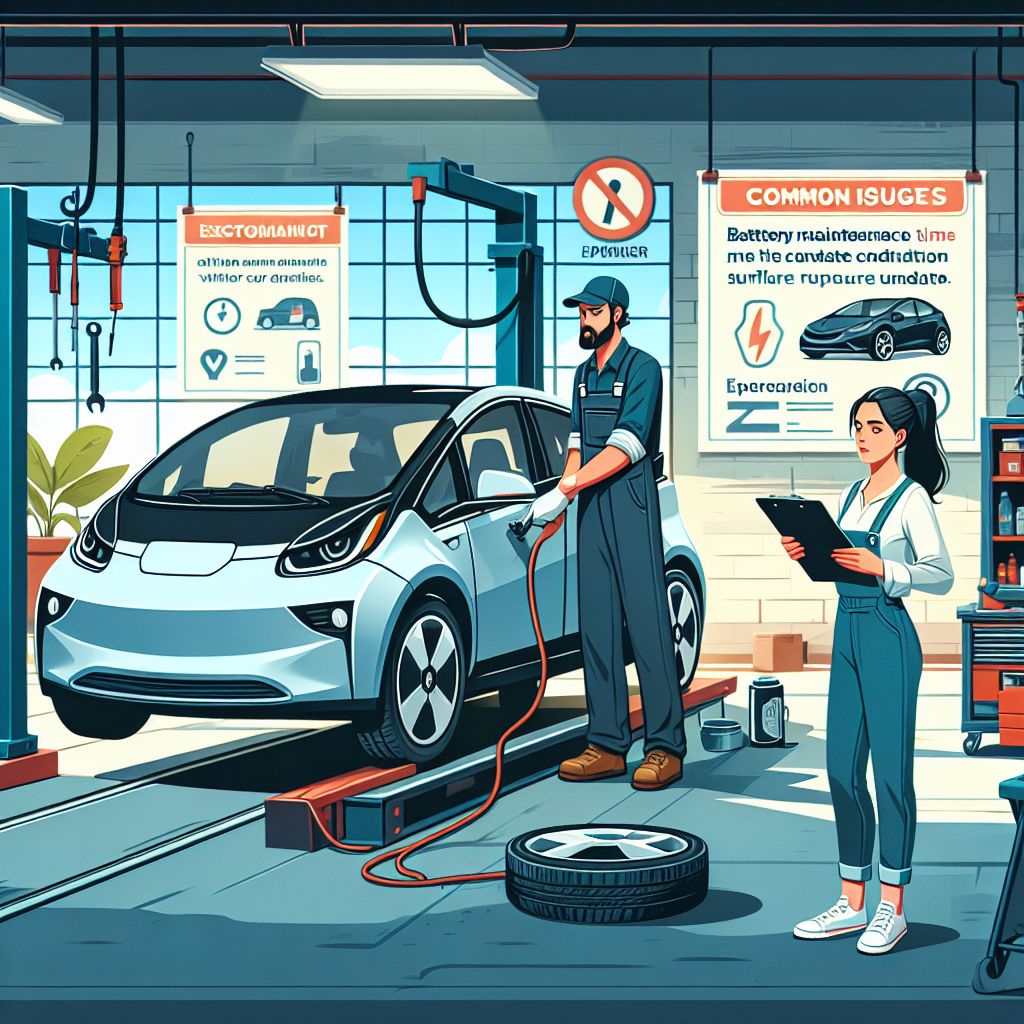
Avoiding Regular EV Maintenance Problems
The best way to avoid regular EV maintenance problems is to be proactive. Always stick to the maintenance schedule recommended by your EV manufacturer and don’t ignore any warning signs. Keep in mind that dealing with a small problem early can prevent a big problem later.
How Temperature Impacts Your Electric Vehicle
Your electric vehicle’s performance and battery life can be negatively impacted by extreme heat or cold. To help prevent this, try to park in a garage or in the shade as much as possible. Additionally, using pre-conditioning features can help your battery reach the optimal temperature before you start driving.
Overcharging and Undercharging: Fact vs Fiction
There is much debate about how charging impacts your EV’s battery. Here’s the reality: understanding EV battery degradation is crucial to maintaining your vehicle’s health.
-
Instead of charging to 100% each day, aim for 80-90% to extend battery life.
-
Don’t let your battery run out completely; try to recharge when it gets down to 20-30%.
These tips will help you keep your battery in good shape and ensure it lasts longer.
DIY or Call a Professional: Making the Right Decision
There are some tasks related to electric vehicle maintenance that you can easily do yourself, such as checking the tire pressure or updating the vehicle’s software. However, you should always leave tasks that involve high-voltage components to the professionals. These tasks require specialized training and tools to be done safely.
Easy Home Upkeep Tips for EV Owners
There are many things you can do at home to keep your EV running smoothly:
-
Always clean your electric vehicle, both inside and outside, to avoid deterioration.
-
Consistently monitor your tire pressure and modify it when necessary.
-
Examine your windshield wipers and substitute them if they appear to be worn out.
These easy chores can contribute significantly to preserving the condition of your electric vehicle.
Red Flags: Know When to Call in the Pros
Keep an ear out for any odd sounds, feels, or dashboard lights. If you spot something that doesn’t seem quite right, it’s time to get a pro involved. Don’t delay, as minor problems can rapidly turn into major ones in an EV thanks to its intricate electronic systems. For more detailed guidance, check out our comprehensive guide on electric car battery performance.
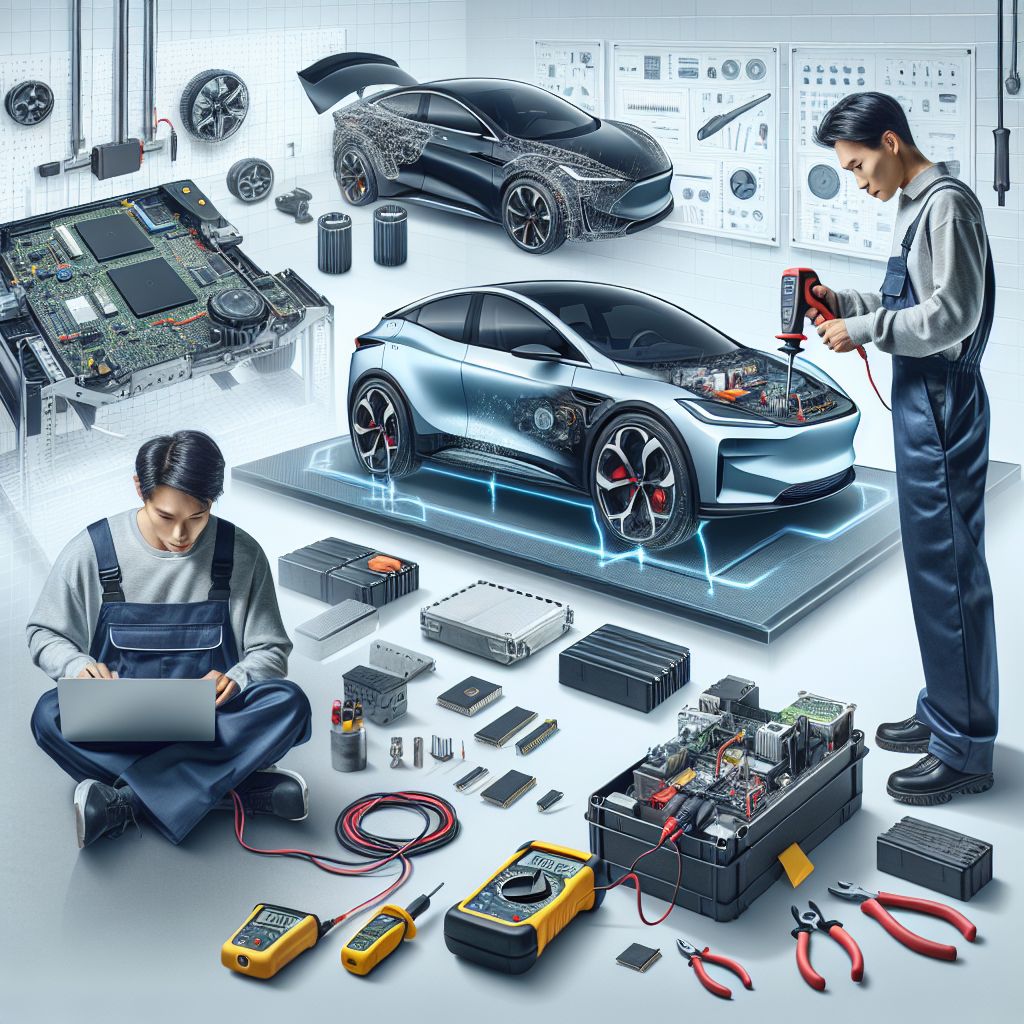
Your electric vehicle is more than just a means of transportation; it’s a significant investment. To safeguard it, it’s essential to keep up with regular maintenance and understand your warranty. Here’s how to do it:
Smart Warranty: Understand What’s Included
Typically, electric vehicles come with a warranty that provides coverage for the battery and electric drive components for a number of years. Be sure to understand what’s included and maintain a record of all maintenance work, in the event that you need to file a claim.
Choosing the Best Mechanic for Your Electric Vehicle
Not all mechanics have experience with electric vehicles, so it’s important to find one who does. Look for mechanics who are certified to work on electric vehicles. They’ll have the knowledge and skills necessary to keep your vehicle in top shape. If you’re not sure where to start, feel free to reach out to us for suggestions.
Knowing the details of your EV’s warranty is akin to having a guide for your vehicle’s upkeep. The key thing it tells you is what kind of services and repairs are included and for what duration. Maintain a log of all the maintenance jobs you or a professional have done, because this paperwork could be vital if you ever need to file a warranty claim.
Identifying the Best Service Provider for Your Electric Vehicle
It’s important to find the right service provider for your electric vehicle to ensure it stays in good shape and lasts a long time. You should look for technicians who have specific training and certification to work on electric vehicles. They will have the knowledge and tools to take care of the special needs of your electric vehicle. If you’re having trouble deciding, don’t worry, we’re here to help. Don’t hesitate to get in touch with us for help in finding the best service provider for your electric vehicle.
Improving Your Electric Vehicle: Add-Ons and Upgrades
Once you’ve gotten used to your electric vehicle, you may want to think about add-ons or upgrades to make your drives even better. Whether it’s better charging equipment or software upgrades, these improvements can make your electric vehicle even more fun to drive. However, make sure that any changes you make don’t void your warranty or mess with your vehicle’s safety features.
Securing a Greener Tomorrow: The Importance of EV Maintenance
Keeping your EV in top shape isn’t just
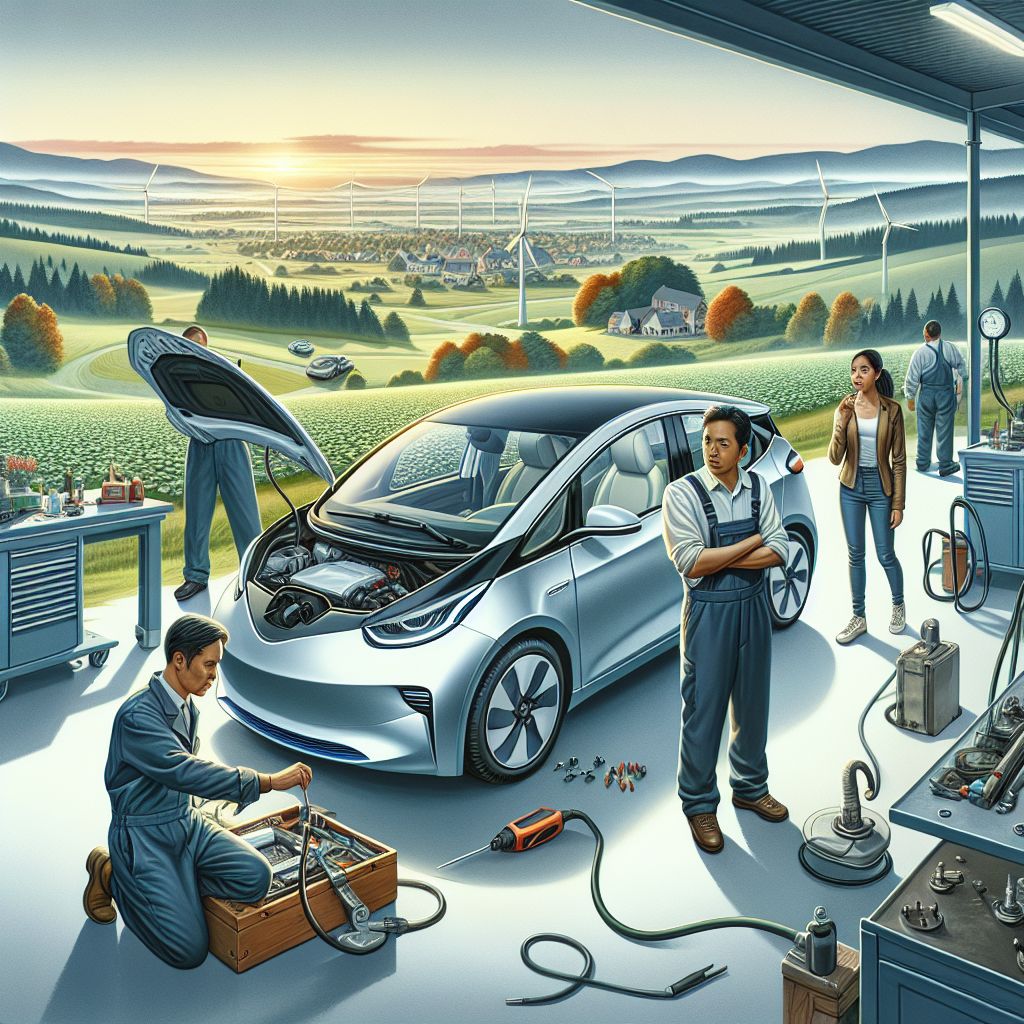
about ensuring a smooth ride—it’s about being part of something bigger. When you take good care of your EV, you’re doing your part to cut down on emissions and save resources, which is good for the planet and future generations.
Helping the Environment
Choosing an electric vehicle over a traditional gas-powered one is a step towards helping the environment. Regular maintenance of your EV ensures it runs at peak efficiency, which can further reduce its impact on the environment. It’s a small but important step towards a greener, more sustainable future.
Keeping Your Car’s Value and Saving Money
Keeping your EV well maintained doesn’t just make it last longer. It also keeps its value high. If you ever decide to sell your EV, you’ll get more money for it if it’s in good shape. Plus, EVs usually need less maintenance than gas cars. So you’ll save money on car care over time.
Common Questions: How to Easily Maintain Your Electric Vehicle
You have queries, and I have the solutions. Let’s simplify electric vehicle maintenance as much as we can.
How Frequently Should I Get My EV Battery Checked?
Refer to your EV’s manual to see when the manufacturer suggests you get your battery serviced. As a general guideline, you should get it checked once a year. However, your EV’s software may also notify you when it’s time for a service.
Can I Do Maintenance Work on My EV Myself?
Definitely! You can perform many simple maintenance tasks, like checking the tire pressure or updating the software, at home. Always refer to your EV’s manual for instructions and leave the more complicated tasks to the experts.
What Are the Most Important Things to Maintain on My EV?
The most important things to maintain include battery health, tire upkeep, and software updates. Also, even though they require less maintenance than in a traditional car, it’s still important to regularly check your EV’s brakes and fluids.
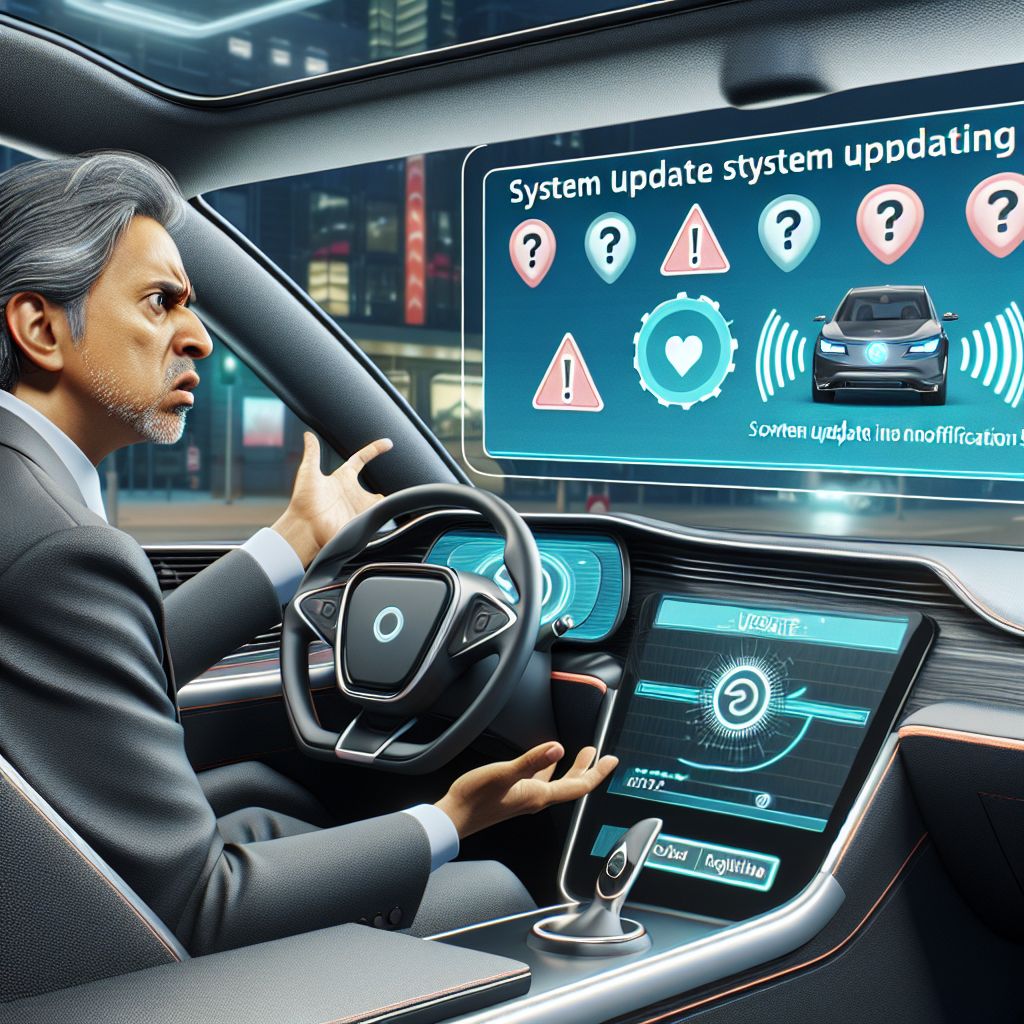
How Can I Tell if My Electric Vehicle’s Software Needs Updating?
Typically, your electric vehicle will alert you if a software update is available. This alert may appear on your dashboard or on a connected app. It’s important to keep your software updated, as it can affect your vehicle’s performance and safety.
What Should I Do if My EV Displays a Maintenance Alert?
If your EV displays a maintenance alert, check your owner’s manual to understand what the alert means and follow the recommended actions. If you’re ever unsure or the issue seems serious, it’s best to contact a professional immediately.
Keeping your EV in good condition doesn’t have to be a daunting task. With these guidelines and some preventative care, you can reap the rewards of EV ownership while ensuring your vehicle remains in peak condition. And don’t forget, if you ever need help or have queries about your EV’s upkeep, feel free to get in touch with us. We’re here to support you at every turn.





Leave a Reply